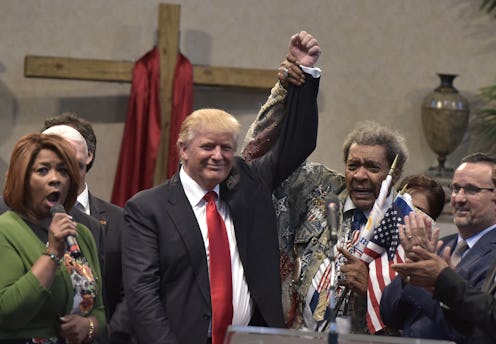News
Trump Endorsing Stop-and-Frisk Wasn't A Great Idea
Earlier today, Donald Trump surrogate Don King caused controversy by dropping the N-word during a Fox-News-hosted campaign event. But King was far from alone in creating waves; Donald Trump problematically endorsed the stop-and-frisk policing tactic, and suggested expanding it beyond New York City. By promoting a strategy that's been decried as discriminatory, the candidate is further alienating minority voters — as if he hasn't done so enough already.
Stop-and-frisk is defined as a “brief, non-intrusive, police stop of a suspect” by the Legal Information Institute. Police may quickly frisk and pat down the outside of a person’s clothing if they suspect that the person has been or will be involved in a crime.
While people like former New York City Mayor Michael Bloomberg have endorsed stop-and-frisk, the fact remains that there is little to no evidence that the policy actually works. David Greenberg, a New York University professor, conducted a comprehensive analysis of the relationship between stop-and-frisk and crime rates, and he has found “no evidence that misdemeanor arrests reduced levels of homicide, robbery, or aggravated assaults,” according to The Atlantic.
Besides being ineffective, stop-and-frisk has been widely called racist and discriminatory. Black people and Hispanic people make up approximately half of the population of New York City, but were stopped 87 percent of the time in 2010. In response to this, Bloomberg cited a black police officer who claimed that stop-and-frisk was about behavior, rather than race. Disregarding the implication that people of color are more likely to behave suspiciously, the numbers disagree with Bloomberg here as well. The New York Civil Liberties Union found that 4 percent of whites who were frisked had illegal weapons, while illegal weapons were found on only 2 percent of blacks and Hispanics frisked.
When Trump applauded stop-and-frisk today, he was answering a question from an audience member about how he would reduce black-on-black crime.
Trump has a history of polling badly with minority groups, and his answer to this question actually caused further discontent over his handling of race relations. For one thing, there is the problem of the very idea of “black-on-black crime,” as crime is usually racially segregated anyway, according to Vox. In 2014, the FBI’s Uniform Crime Report showed that 82 percent of white homicide victims were killed by other white people, with similar statistics for black victims. Factors such as poverty and geographic location contribute to crime rates, and due to systemic inequalities, the poverty rate in 2015 for black people was much higher than that of white people (27.2 percent versus 9.6 percent).
Trump also ignored quantitative evidence and said that stop-and-frisk "worked incredibly well" just a few days ago in Philadelphia.
For all the support Trump and Bloomberg have shown for stop-and-frisk, current New York City Mayor Bill de Blasio does not share Trump's sentiments on it, and the police department disassociated itself from the policy shortly after de Blasio took office.
Still, with his support of stop-and-frisk and his unfortunate selection of a surrogate in Don King, Trump managed to further alienate the black community. Registered independent Geoff Betts, who is black, told Reuters he opposes stop-and-frisk, and that he walked out of the meeting after hearing Trump's response. "We are victims," he said, referring to police discrimination against black people. "I just couldn't take it anymore, I had to go. I don't think that Donald Drumpf gets it."
